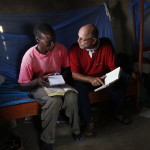
A Word from Curt:
Two good words today: Leader and Hero
Today’s Prayer Point: Pray for Pastor John Monchyol in Malakal, South Sudan
“There go my people.
I’m their leader.
I’d better catch up with them.”
-Mahatma Gandhi
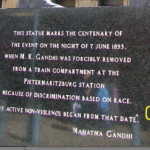
- A leader leads.
Gandhi’s words are accurate.
You cannot lead without followers.
Gandhi led a huge nation, India, to freedom using non-violent means.
He’s always been one of my heroes.
A leader must have followers.
And sometimes a leader must go find his people.
Find his followers.
Connect with his flock.
I want to broach that subject with two more of my heroes.
You may know one.
His name is Fred Luter.
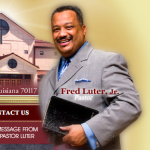
You won’t be familiar with the second hero.
His name is John. John Monchyol. I’ll share his heroic story later.
Fred Luter is pastor of Franklin Avenue Baptist Church in New Orleans. He has achieved fame as president of our Southern Baptist Convention.
I‘m Southern Baptist.
Now, don’t get started.
I know every caricature, joke, and stereotype about us.
I can tell them and laugh harder than anyone*
What makes Fred Luter unique is that he is black.
And our Southern Baptist Convention broke away from other Baptists over the issue of black slavery.
We’ve been pretty lily-white since our birth in 1846.
I’m not proud of it. But it is a fact.
I knew Pastor Fred Luter long before he became famous.
In 1986, he was appointed as pastor of Franklin Avenue Baptist, a declining church in a changing neighborhood.
That’s a nice way of saying it was a white church now surrounded by a black community. Pastor Fred was told by leadership, “Either revive this church or bury it.”
God used Fred to build a strong church that reached out to its community. He built a strong church in a tough part of New Orleans.
He’s deeply loved among Louisiana Baptists for additional reasons.
He’s a great preacher.
He loves people.
Fred is a caring pastor.
2005. Then Katrina came.
Franklin Avenue Baptist was under ten feet of water.
Fred’s flock scattered all over the United States.
His church– the building as well as the members– were gone.
He was a leader without followers.
A shepherd without his flock.
So pastor Fred became proactive. He began searching for his people. Member by member, tracking them down.
He soon found that large pockets of Franklin Avenue B.C. were located in Houston and Atlanta.
So he began gathering his members together in those cities. This meant a great deal of travel and flexibility on Fred’s part.
It didn’t matter.
He’d found his people
And he was doing what he was called to do. Pastor and preach to the Franklin Avenue congregation.
Over time, evacuees began trickling back into New Orleans.
Many chose not to return, but others went back to help rebuild their city.
However, those from Franklin Avenue found their church and neighbourhood destroyed.
So the reconvened church began using the facilities of a sister church, First Baptist New Orleans. It was a unique partnership between two very diverse but wonderful churches. Eventually, a new and beautiful Franklin Avenue Baptist Church was built in the old neighbourhood. I’m told it is growing and reaching out to its community.
Led by one of my heroes, a shepherd named Fred.
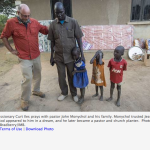
My second hero isn’t American.
He’s Dinka.
South Sudan’s largest tribe.
His name is John Monchoyl and he is a church planter in Upper Nile state.
Pastor John started five churches in and around Malakal, the largest city in NE South Sudan.
Malakal is inhabited by three tribes: Dinka, Nuer, and Shilluk.
John’s an equal opportunity church planter.
He planted churches among each tribal group as well as several mixed congregations.
When South Sudan descended into anarchy just before Christmas 2013, the areas with mixed tribal groups saw the worst violence. and that included Malakal.
The city was fought over by government forces and the rebels.
It changed hands five times in a matter of months. The only safe place was in the local UN compound.
During a lull in the fighting, John and ten members of his extended family made their way to Juba, South Sudan’s capital.
They then began the long journey to West Nile District Uganda. That’s when we met him in Arua. They registered at a nearby refugee settlement, Rhino Camp.
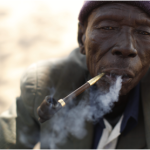
John told us point blank, “I’m leaving my family here where it’s safe. I’m going back to South Sudan.
“That’s where my people are.
They’re hurting and suffering and I must be back among them.”
He stated this even as news reports described Malakal as a “ghost town.”
The town had been razed.
John was told all of the churches were burned and gutted.
I wondered how many of Pastor John’s church members were still there.
How many had died. What he would find there.
It didn’t matter to John.
He was going to where his people were.
To the place where they needed him most.
If they were suffering, he would suffer with them.
He would give them the greatest gift of a leader. His presence in a time of trouble.
I’ve received texts from Pastor John in Malakal.
He says things are safe and he is fine.
It’s hard to read between the lines of a SMS, so I’ll take him at his word.
I ask you to join us in praying for John Monchoyl and the Malakal Baptist Churches.
I’d love to hear from some of you who’d like to personally take on praying for this hero of mine.
A leader, who like my friend Pastor Fred, went to find his people.
A hero, like Gandhi, who refused to grasp hate and revenge or abandon his people.
Leaders worth following.
Heroes worth telling about.
May the same be said of all of us.
Learn more about Pastor John’s ministry and life.
* Two Southern Baptist stories:
Question: “How many Southern Baptists does it take to change a light bulb?”
Answer: “Change? What do you mean ‘change?’ ”
A tale is told of a dry county in Texas where the sheriff confiscated a large quantity of illegal whiskey. Not being sure of how to dispose of the contraband, he came up with a novel idea to take care of several problems. He poured the whiskey on the Johnson Grass in the fields and the Baptists ate it down to the roots.
 Creekbank Stories Curt Iles, Storyteller
Creekbank Stories Curt Iles, Storyteller
